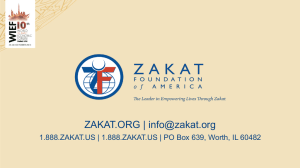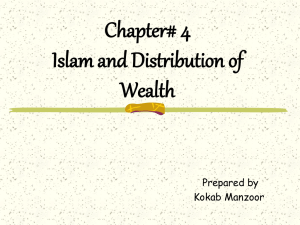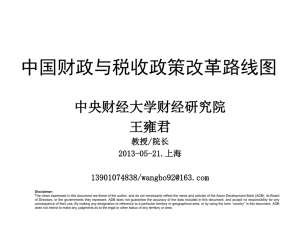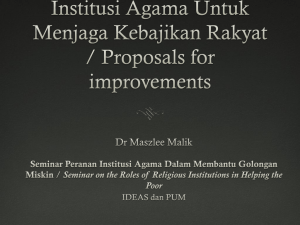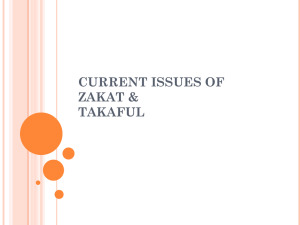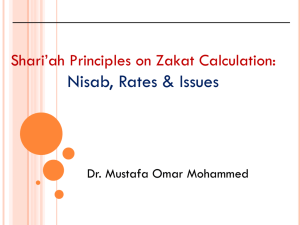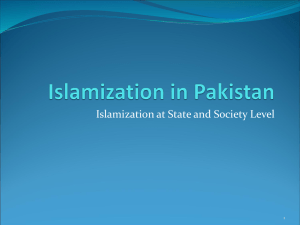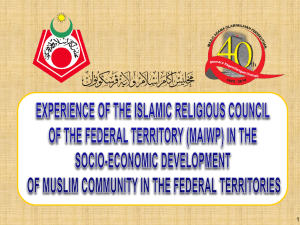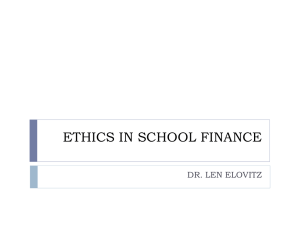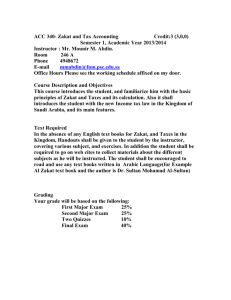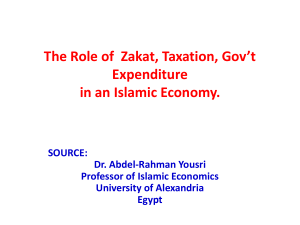Introduction to Learning Curves
advertisement
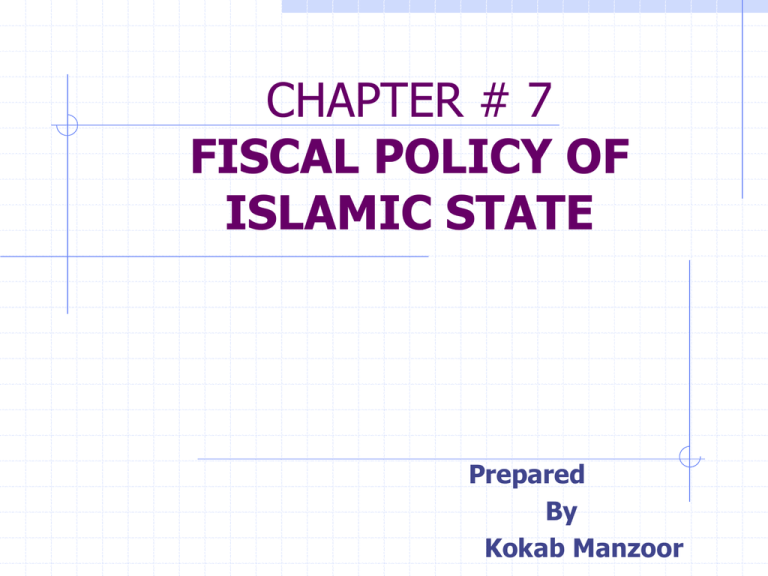
CHAPTER # 7 FISCAL POLICY OF ISLAMIC STATE Prepared By Kokab Manzoor Chapter`s Outlines Meaning of Fiscal Policy Fiscal Policy of Islamic State Zakat as an Instruments of Fiscal Policy Impact of Zakat on Economy Bait-Ul-Mal, its definition and sources Theory of taxation and principle of taxation Nature of Public Expenditures in Islamic State Meaning of Fiscal Policy All actions and administrative measures of the government which are related to revenue and expenditure are called Fiscal policy. Instruments of Fiscal Policy Government expenditure Direct & Indirect Taxes Deficit Financing Subsidies Transfer Payments Islamic State & its Fiscal Policy Objectives of the fiscal policy of the Islamic state 1 2 3 4 5 6 Eradication of Unemployment Equitable Distribution of Wealth Economic Stability Faster Economic Progress Full Employment Efficient Allocation of Resources Zakat as an instrument of Fiscal Policy The most important element of Islamic fiscal policy is Zakat. Zakat must be expended in the same area from which is collected. If however the surplus remains after supplying the wants of the deserving people of the area, it can be transferred for expenditure in other area Role of Zakat as an instrument of Fiscal Policy Equitable distribution of wealth Achieving full employment without inflation Effects of Zakat on the allocation of resources Zakat and Economic Stability Impacts of Zakat on Economy Impact of Zakat on Consumption Impact of Zakat on Investment Impact of Zakat on Saving Impact of Zakat on Economic Development The institution of Bait-UL-Mal Definition Literally “bait ul Mal” means “ the house of wealth” In technical terms, “ it is the establishment of public exchequer is necessary to enforce the economic system of Islam” The rules of receipts and disbursement of bait-ul-Mal have been formulated in Islamic system of government Sources of Revenue of BaitulMal 1 Zakat 3 Jazia 5 Sadaqat 7 Khumas 9 Rent (KAR-AL-ARD) 10 Ashoor (Import Duty) 11 Waqf (Trust) 2 4 6 8 Ushar Kharaj Faie Dariab 12 Other Source Is taxation allowed..?? Yes , BUT All taxes other than Zakat are imposed as an exception NOT rule Islamic state is authorized to impose taxes in addition to Zakat as a supplementary or complementary policy because, Achievement of Sustenance Welfare is a duty of Islamic state and Greater Welfare is desired. Theory of Taxation In the traditions the word “Makas” has been used to denote “Tax”. The tax collector was called “Al-Makas” First time, in the reign of Hazrat Umar (R.A) the duty was imposed on Muslims and merchants of Non Muslim countries. If anyone had paid Zakat he could seek exemption by submitting an affidavit. Principles of Tax Policy in Islam 1 2 3 4 5 6 7 8 To be imposed under dire necessity Should coincide with the period of need Fulfill the objectives of the Islamic Government Ability to pay The Principle of Equity The Principle of certainty The Principle of convenience The Principle of Economy Nature of Public Expenditure in Islamic State There are two kinds of public expenditure in Islamic Economy 1 Permanent Heads of Expenditure 2 Expenditure necessary under present circumstance 1 Permanent Heads of Expenditure Defense Law and order Justice Provision of basic necessities Propagation of Islam Promotion of Good and prevention of evil Civil administration For social services 2 Expenditure Necessary Under Present Circumstance Environmental safeguard Necessary goods Scientific research Capital formation and economic progress Subsidies for important private activities Cost of achieving economic stability Expenditures required to organize additional activities assigned to state by the people. Principles of Public Expenditure Achievement of objectives of Fiscal Policy The Principle of public welfare The Principle of Justice The Principle of simplicity To safeguard the rights of future generation The Principle of inter regional development The principle of avoiding delay The principle of fulfilling the needs of the people THX
